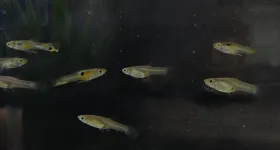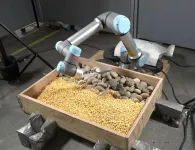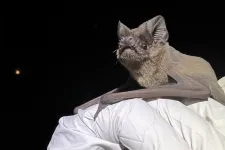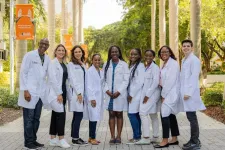(Press-News.org) This year’s Presidential Symposium places plant science within a larger context, spotlighting the connections between plants and humanity. Accordingly, ASPB President Gustavo MacIntosh selected speakers with a broad array of backgrounds and expertise. Yet when the Presidential Symposium takes place Saturday, August 5, at 1:30 pm, you’ll find they agree on critical fundamentals.
“Humans are totally dependent on plants for food,” began Barbara Schaal of Washington University.
“When it comes to agriculture, plants and people are really two faces of the same coin,” added Matteo Dell’acqua of Scuola Superiore Sant’Anna. “In a sense, when we domesticated crops thousands of years ago, they domesticated us too. So much human history has been shaped by the opportunities and constraints of agriculture.”
“I grew up on a small farm in in North Carolina, and I’ve always been fascinated by plants,” said Terri Long of North Carolina State University. “Now I’m lucky enough to work with people in all kinds of disciplines, all focused on developing new tools and techniques for addressing societal problems associated with food, fiber and fuel.”
“It’s plants that are constantly telling us what’s going on in the world,” CheFarmer Matthew Raiford observed. “For example, where I see dollar weed – you may know it as penny wort – growing, I know there’s excess water in the ground.”
“It’s nature and culture,” affirmed Dell’acqua. “I’m a quantitative scientist, coming from plant genetics. When we started looking at the genomics of agrobiodiversity while factoring the traditional knowledge of smallholder farmers, we saw immense capacity for enhancing local well-being and promoting sustainable development.”
“Gardening and farming exploded during the pandemic,” continued Raiford. “The number of plants planted was monumental. We had to return to nature, to the land. All kinds of people drew comfort from plants. They also thought, oh, this snake plant helps improve the air in my home. The world went crazy for plants.”
“We need that diversity of skill sets, and a diversity of perspectives, to really address the grand challenges in our society related to plant sciences,” said Long. “We need people from all walks of life, from all disciplines – not just physiologists and molecular biologists, but social scientists, mathematicians and economists. We’re all part of the answer to the question of how we will continue to provide for a growing population.”
“I also believe interdisciplinary science is needed to answer today’s challenges,” Dell’acqua said. “They can’t be answered by focusing on a narrow field of research. I am striving to connect the dots.”
“The potential for developing new plant varieties and species with greater nutritional value, adapted to changing climates, is incredibly exciting,” said Schaal. “One way it could be done is by combining traditional but underutilized species with advanced plant breeding and gene editing.”
“We spray chemicals on pigweed,” Raiford mentioned. “But it’s an amaranth that can be used in the dish callaloo.”
The speakers also agreed they’re looking forward to all the opportunities of Plant Biology 2023. “I really want to hear where the plant science world is relative to regenerative agriculture,” said Raiford. “A lot of the time we throw away roots that can continue to grow – lettuces, celery, pineapple, green onions. How many other plants are like that? Can this change how we think about food systems?”
“On a personal level, I’ve made some wonderful friends in this field, and I hope there are many more out there to meet,” said Long.
Read the plenary description, and see more scientific content in the complete Plant Biology 2023 program.
###
ASPB is a professional scientific society, headquartered in Rockville, MD, that is devoted to the advancement of the plant sciences worldwide. With a membership of some 3,000 plant scientists from throughout the United States and around the world, the Society publishes two of the most widely cited plant science journals, The Plant Cell and Plant Physiology, and co-publishes the Open Access journal Plant Direct. ASPB also hosts the annual Plant Biology conference; supports plant science outreach, engagement, and advocacy; and powers the Plantae digital ecosystem for plant scientists. For more information about ASPB, please visit https://aspb.org/. Also follow ASPB on Facebook at facebook.com/myASPB, on Twitter @ASPB, and on LinkedIn at https://www.linkedin.com/company/98656.
END
Plant Biology 2023 plenary closeup: Connecting the dots
The ASPB Presidential Symposium spotlights connections between plants and humanity
2023-07-12
ELSE PRESS RELEASES FROM THIS DATE:
Tiny fish surprise scientists in ‘volunteer’s dilemma’
2023-07-12
Tiny fish called Trinidadian guppies have surprised scientists when faced with the so-called “volunteer’s dilemma”.
The idea of the dilemma is that individuals are less likely to cooperate if they are in a large group.
Various studies have demonstrated this in humans – but guppies appear to buck the trend.
In the new study, by the University of Exeter, guppies in larger groups were more likely to risk approaching a predator to gather information for the shoal.
“When faced with a possible predator, guppies have to balance risks,” said Rebecca Padget, from Exeter’s Centre for Research in Animal Behaviour.
“At least one ...
Six research centers will lead innovation towards a fully sustainable energy sector
2023-07-12
An investment of £53 million in six research centres will drive forward change in the energy system and help to meet the UK’s net zero target by 2050.
The energy research centres will boost knowledge, create innovative green technologies and reduce demand for energy to achieve greener, cleaner domestic, industrial and transport energy systems.
UK Research and Innovation (UKRI) has awarded:
£15 million for a new Energy Demand Research Centre that will provide solutions for energy demand reduction, understand the impact on consumers, and enable equitable policy decision-making.
£17.5 ...
Training robots how to learn, make decisions on the fly
2023-07-12
Mars rovers have teams of human experts on Earth telling them what to do. But robots on lander missions to moons orbiting Saturn or Jupiter are too far away to receive timely commands from Earth. Researchers in the Departments of Aerospace Engineering and Computer Science at the University of Illinois Urbana-Champaign developed a novel learning-based method so robots on extraterrestrial bodies can make decisions on their own about where and how to scoop up terrain samples.
“Rather than simulating how to scoop every possible type of rock or granular material, ...
Substance use linked to long-lasting brain changes, cognitive decline
2023-07-12
An estimated 50 million individuals in the United States struggle with the challenges of cocaine or alcohol use disorders, according to the National Institutes of Health (NIH). Beyond the well-documented health risks, addiction to these substances detrimentally affects our cognitive flexibility, which is the ability to adapt and switch between different tasks or strategies. Although previous research has hinted at this connection, the underlying reasons for this cognitive impairment remain elusive.
Cognitive flexibility is a crucial element in various domains of our life, including ...
CU Anschutz study shows CBD use in pregnancy could impact the fetal brain
2023-07-12
AURORA, Colo. (July 11, 2023) – Researchers at the University of Colorado Anschutz Medical Campus have found that cannabidiol (CBD), often used to treat anxiety and nausea, can potentially harm a developing fetus.
The paper was published in Molecular Psychiatry today.
People consume cannabis or a non-psychoactive component cannabidiol (CBD) to help with nausea and anxiety during pregnancy because they think it is safe and healthy. But CBD crosses the placenta and accumulates in the fetal brain.
Until now, no one knew how fetal exposure to CBD affected brain development, said Emily ...
Paths for reducing harmful air pollution in South Asia identified
2023-07-11
Fine particulate matter comes from wood burning, power generation, motor vehicles and other combustion sources that emit tiny particles into the air. At only 2.5 micrometers or smaller, these particles are small enough to be inhaled and cause lasting damage to the heart and lungs. Known as PM2.5, exposure to these particles is a leading mortality risk factor in India and the surrounding region of South Asia.
A new study by researchers in Randall Martin’s lab in the McKelvey School of Engineering at Washington University in St. Louis evaluated the contribution of various emission sectors and fuels to PM2.5 mass for 29 states in India ...
Zoonotic researcher receives ORAU Ralph E. Powe Junior Faculty Enhancement Award
2023-07-11
Daniel Becker, Ph.D., an assistant professor of Biology in the Dodge Family College of Arts and Sciences, has received an Oak Ridge Associated Universities Ralph E. Powe Junior Faculty Enhancement Award for his continued research on bat migration in western Oklahoma.
“We’re studying migratory Mexican free-tailed bats and the pathogens they might carry that are possible threats to human or wildlife health,” Becker said. “This award allows us to purchase the microchips we implant in the bats and ...
Cancer disparities: Sylvester researchers, collaborators seek answers to prostate, breast cancer among people of African ancestry
2023-07-11
MIAMI, FLORIDA (July 11, 2023) – “Please, please do it (cancer screening), if not for yourself, then for the next generation. We need to see the day when we end cancer.”
Those are the impassioned words of Charinus Johnson-Davis, who was diagnosed with breast cancer a dozen years ago but is now cancer-free after a double-mastectomy and 28 rounds of chemotherapy plus radiation. She is on a mission to help address cancer disparities affecting Black women and men, and is one of the first to enroll in the African Cancer Genome Registry, a new study at Sylvester Comprehensive Cancer ...
AGS supports CMS decision to require real-world data for monoclonal antibodies
2023-07-11
New York (July 11, 2023) — The American Geriatrics Society (AGS) supports the recently announced decision from the Centers for Medicare and Medicaid Services (CMS) to require the collection of real-world information via a registry to study monoclonal antibodies directed against amyloid for the treatment of Alzheimer's disease. This decision applies to monoclonal antibodies that receive traditional approval from the Food and Drug Administration (FDA). Currently, lecanemab (trade name ...
GSA Connects 2023: A premier international scientific meeting
2023-07-11
11 July 2023
The Geological Society of America
Release no. 23-25
Contact: Justin Samuel
+1-303-357-1026
jsamuel@geosociety.org
For immediate release
GSA Connects 2023: A Premier International Scientific Meeting
The Geological Society of America visits Pittsburgh
Boulder, Colo., USA: Media registration is open now for The
Geological Society of America’s Connects 2023
meeting, to be held 15–18 October 2023 at the David L Lawrence Convention
Center (1000 Fort Duquesne Blvd) in Pittsburgh, Pennsylvania, USA. The
organizing committee is pleased to be planning a dynamic meeting centered
around ...
LAST 30 PRESS RELEASES:
When safety starts with a text message
CSIC develops an antibody that protects immune system cells in vitro from a dangerous hospital-acquired bacterium
New study challenges assumptions behind Africa’s Green Revolution efforts and calls for farmer-centered development models
Immune cells link lactation to long-lasting health
Evolution: Ancient mosquitoes developed a taste for early hominins
Pickleball players’ reported use of protective eyewear
Changes in organ donation after circulatory death in the US
Fertility preservation in people with cancer
A universal 'instruction manual' helps immune cells protect our organs
Fifteen-year results from SWOG S0016 trial suggest follicular lymphoma is curable
The breasts of a breastfeeding mother may protect a newborn from the cold – researchers offer a new perspective on breast evolution
More organ donations now come from people who die after their heart stops beating
How stepping into nature affects the brain
Study: Cancer’s clues in the bloodstream reveal the role androgen receptor alterations play in metastatic prostate cancer
FAU Harbor Branch awarded $900,000 for Gulf of America sea-level research
Terminal ileum intubation and biopsy in routine colonoscopy practice
Researchers find important clue to healthy heartbeats
Characteristic genomic and clinicopathologic landscape of DNA polymerase epsilon mutant colorectal adenocarcinomas
Start school later, sleep longer, learn better
Many nations underestimate greenhouse emissions from wastewater systems, but the lapse is fixable
The Lancet: New weight loss pill leads to greater blood sugar control and weight loss for people with diabetes than current oral GLP-1, phase 3 trial finds
Pediatric investigation study highlights two-way association between teen fitness and confidence
Researchers develop cognitive tool kit enabling early Alzheimer's detection in Mandarin Chinese
New book captures hidden toll of immigration enforcement on families
New record: Laser cuts bone deeper than before
Heart attack deaths rose between 2011 and 2022 among adults younger than age 55
Will melting glaciers slow climate change? A prevailing theory is on shaky ground
New treatment may dramatically improve survival for those with deadly brain cancer
Here we grow: chondrocytes’ behavior reveals novel targets for bone growth disorders
Leaping puddles create new rules for water physics
[Press-News.org] Plant Biology 2023 plenary closeup: Connecting the dotsThe ASPB Presidential Symposium spotlights connections between plants and humanity







